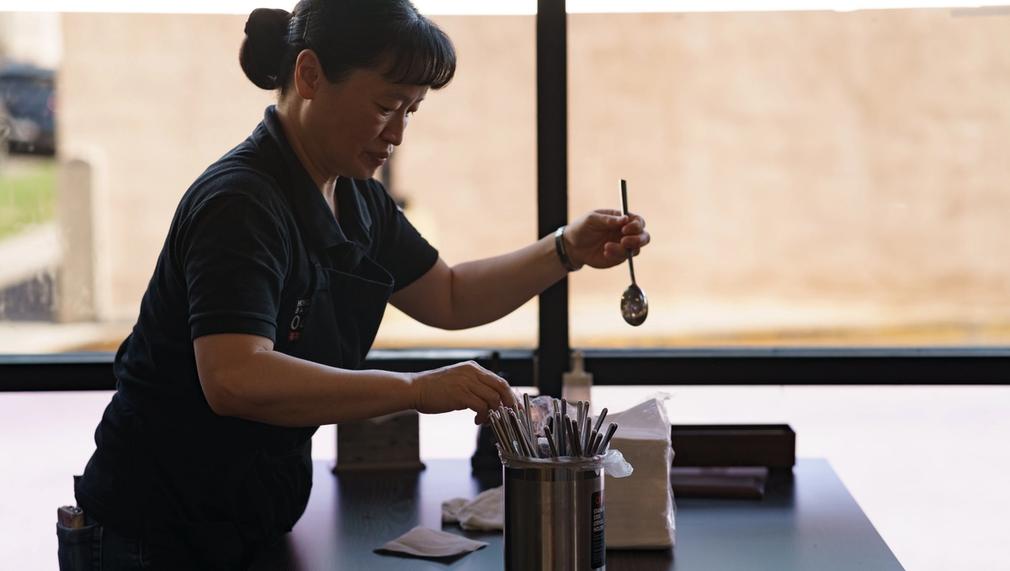A Just Food Movement for LA
LA’s restaurant scene is world renowned but plagued with economic insecurity. This project improves working conditions in the restaurant industry by raising labor standards and leveling the playing field for small business owners. By establishing a Restaurant Council of workers, government officials, and responsible restaurant owners to monitor and nurture the restaurant industry in Koreatown and beyond, KIWA will ensure that restaurant workers receive a fair wage and local restaurant owners can compete fairly in the sector.

What is the primary issue area that your application will impact?
Income inequality
In what stage of innovation is this project, program, or initiative?
Pilot or new project, program, or initiative (testing or implementing a new idea)
What is your understanding of the issue that you are seeking to address?
In 2023, LA’s economy soared and unemployment decreased, yet income inequality and the wealth gap continue to grow. To address this, KIWA has fought to improve working conditions in low-wage industries. Our base, Koreatown, has the highest density of restaurants in LA County: nearly 700 in less than 2-square miles employing almost 10,000 workers. The majority of these workers earn low wages due to issues like wage theft, wage ceilings, and tip theft. As one worker interviewed by KIWA explained: “Always the minimum. We are all paid the minimum. I have been here ten years and it is still the same.”
Improving conditions also requires leveling the playing field for small restaurant owners. Facing competition from international chains, small, neighborhood-serving restaurants face razor thin profit margins and displacement risk. Moreover, ethically-minded diners have little to no knowledge of the working conditions at different restaurants and cannot make informed choices about where to eat.
Describe the project, program, or initiative this grant will support to address the issue.
Building on KIWA’s research and report with the UCLA Labor Center (“Overcooked & Underserved: The Challenges of Koreatown’s Restaurant Workers”), we and our partners are working to develop and implement new industry standards in partnership with workers and local business owners that ethically serve their employees and communities. Our vision is for a future LA where customers think beyond “is this good food?” to “is this business serving its employees and the community?” Our project to cultivate an LA restaurant industry that values its employees as much as its profits has 3 core components: 1. Launch a Koreatown Restaurant Council consisting of workers, government officials, and business owners who are investing in the well-being of employees. The Council will establish guidelines and best practices, modeling good employer practices for the rest of Los Angeles and the broader restaurant industry. 2. Promote the Koreatown Restaurant Council and other ethical business owners in Los Angeles to the public. Working with media partners and food writers/influencers across LA, our goal is to direct support and positive publicity to equitable employers and demonstrate to the broader industry that investing in healthy employment practices pays off. 3. Begin developing a policy campaign to pass an enforceable LA City ordinance that will raise working conditions across the restaurant industry and provide benefits and incentives to small business owners that are struggling to get by.
Describe how Los Angeles County will be different if your work is successful.
LA has one of the best and most diverse food scenes in the world, and immigrant workers and small business owners are the heart and soul of it. We want Los Angeles to be known not only for the quality of its food, but also the way it treats its workers. By establishing a Koreatown Restaurant Council and promoting and uplifting responsible restaurant owners, we will help launch a movement of restaurateurs, workers, and consumers working for a LA restaurant industry renowned for both quality of food and quality of jobs. More importantly, improving conditions in the industry will translate directly to greater job and housing security for one of the city’s most vulnerable populations. As one business owner recruited to the Council put it, he “envisions a service industry where a worker can have a career that supports them throughout their life, improving their craft every day and earning a livable wage.”
What evidence do you have that this project, program, or initiative is or will be successful, and how will you define and measure success?
KIWA has been laying the groundwork for a Restaurant Council for many years, but the implementation will be a new step for us in 2024-25. Our organizers will meet with ~300 workers to survey which restaurants deserve the ethical employer status that a spot on the Council will bring. KIWA’s research team will then produce reports detailing the management and financial operations of up to 40 restaurants. We will measure the first-year success of the Council by the number of restaurants and workers involved. To measure the success of our promotion campaigns for ethical employers, we will track mentions in the press and with influencers, as well as reach and engagement of our social media and newsletters. Most importantly, we will track the performance of restaurants before and after working with the Council. We will conduct interviews with employees to ask if they are experiencing better treatment and fair wages at work, and whether the overall quality of their life has improved.
Approximately how many people will be impacted by this project, program, or initiative?
Direct Impact: 3,000.0
Indirect Impact: 200,000.0